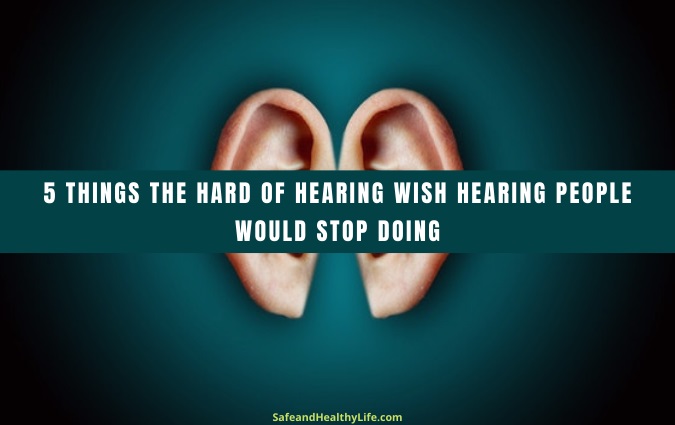
When is the last time you took your ability to hear for granted?
Likely as not, it was until you started reading this post. How would you react if you were to suddenly lose this core sense?
Second question, how would you feel if you suddenly had to face down years of stigma and condescension? Not great, I’ll wager. Yet this is exactly the reality that the hard of hearing must regularly confront.
But although society can be unkind to those struggling with hearing loss, you can do your part to make it a little bit kinder by considering these five things the hard of hearing wish hearing people would stop doing.
1. Overdoing Enunciation
There’s no reason to use overly-exaggerated syllables, talk extremely slowly, or shout. Not only does this actually distort the noise and make it even more difficult to understand, but it’s also incredibly rude, while also making it more difficult for those that rely on lip-reading. On top of that, it can make the person feel ashamed and upset, is highly unprofessional, and actively contributes to the stigma attached to hearing loss.
Patronization is always hurtful, no matter if it’s joking or playful.
Additionally, don’t “pretend” to sign. Hearing loss is not a comedic punchline. Making someone with hearing loss the butt of your jokes is cruel and immoral.
Respect is not a difficult concept, learn it.
2. Prying
Hearing loss is a difficult, often very private topic. Some people therefore would prefer not to field questions regarding their condition, such as whether or not they use a hearing assistance device. Your questions may seem innocent and genuinely well-intentioned to you, certainly.
But ask yourself how many times someone else has asked that person the exact same question in the exact same way. It’s frustrating to answer the same questions over and over, especially if they’re prying ones. And unsolicited advice is even worse.
As such, before you ask or volunteer something, consider the following:
- Stop asking about cochlear implants. Many people who are profoundly deaf do not wish to have one. That is their decision, and they are under no obligation to explain themselves to you.
- Search for the answer online before asking. The Internet is a vast resource, filled with information.
- Read up on hard of hearing (HoH) etiquette, and see what members of the HoH community have to say about what you plan to ask.
3. Forcing Help
Admitting help, they say, is a brave, mature thing to do. But that’s only if you need it or want it. It’s perfectly acceptable to have no desire for assistance, and for many, it’s a point of pride.
The thing a lot of people don’t get is that not everyone needs to have some vulnerable, dramatic breakdown. Not everyone with hearing loss is going to be bothered by the condition, or require a great deal of help. And some people prize independence more than personal convenience.
Let them approach you if they need help. And even if you see someone struggling, resist the urge to take over and do it for them. It’s embarrassing if someone acts as if you’re incapable of taking care of yourself, just as it’s humiliating to have someone speak down to you or treat you like you’re broken in some way.
You would want independence and space if the situation were reversed, so treat HoH people with the same dignity.
4. Underestimating What They Understand

Photo Credit: Pexels
When you have hearing loss, reading body language is something you learn fairly quickly. It helps provide context your ears miss, and eventually, with practice, it becomes easy to gauge someone’s intentions. That includes fake sincerity.
Hearing loss does not mean loss of competence. Once more, for the people in the back. Hearing loss does not mean loss of competence.
Just because someone cannot physically hear you speak, do not assume they can’t understand what you’re saying. Not everyone has 100% hearing loss or hearing loss in both ears. And just because someone has trouble hearing you, that does not make them any less intelligent.
5. Treating Them Too Differently
The hard of hearing are people, not props. When you suffer from any sort of chronic condition, it quickly becomes very obvious when someone genuinely cares about you, and when they’re trying to use you to get attention for themselves.
Being friends with someone who’s hard of hearing is not a heroic sacrifice.
It’s also important to understand the mental health effects of hearing loss. It carries a very real fear of rejection and the worry that people might think that they’ll be slowly pushed out of social groups due to their condition. Feelings of isolation tied to communication barriers and frustration over disrespect are also common.
Also, understand that there are some aspects of the condition that can only be understood through experience. You are not going to help someone with hearing loss “cure” their condition through pointless suggestions like holistic treatments. You should expect to be rebuffed if you make recommendations like this.
If you get insulted or defensive about this rejection, you are the problem here. You need to understand that an HoH person’s condition is not about you. They’ll ask you for help if they need it.
About The Author:
Pauline Dinnauer is the VP of Audiological Care at Connect Hearing, which provides industry-leading hearing loss, hearing testing, and hearing aid consultation across the US.




